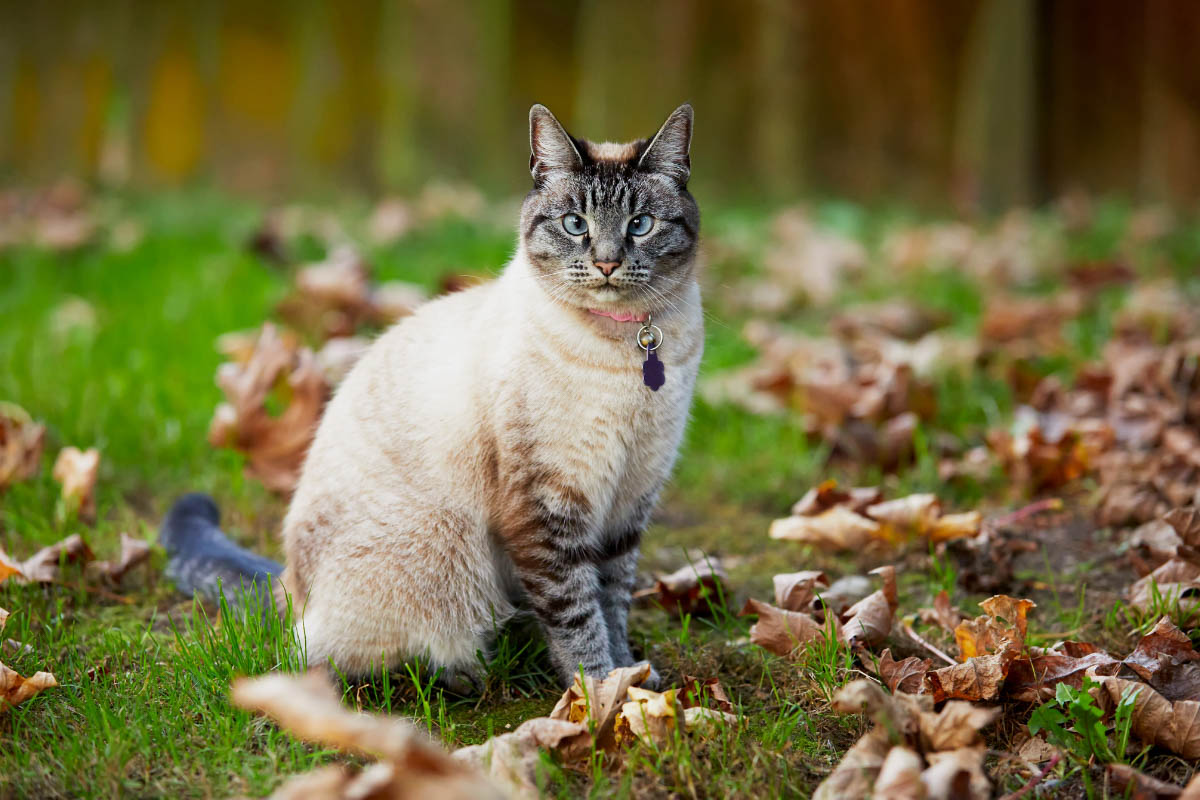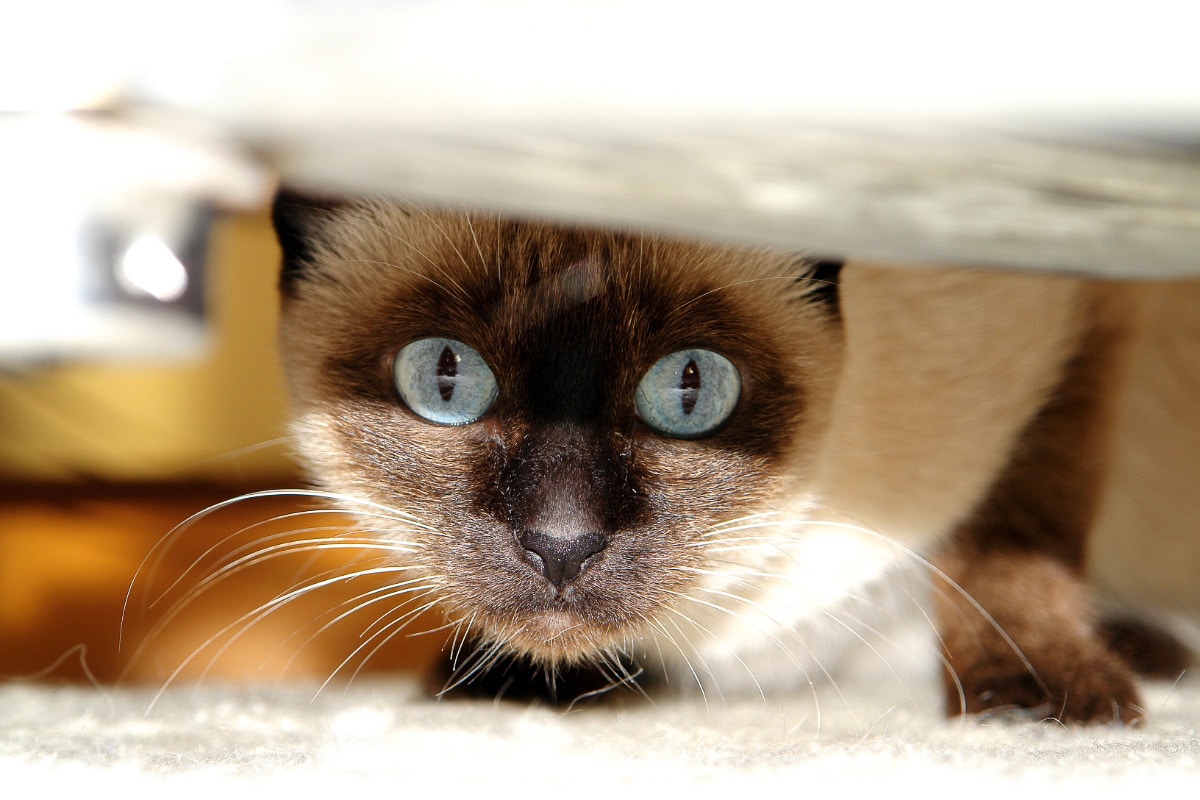Of all the cats that have become human companions, Siamese cats have a reputation for being extraordinarily talkative and interactive. They always want to say something, and from an early age, they learn that asking for food and other kinds of attention is the way for them to benefit from you.
But there are several reasons why Siamese, in particular, have become so vocal. In fact, they are famous for it, and Siamese personality has a lot to do with it. Let’s take a fun and exciting dive into why do Siamese cats meow so much.

You might enjoy reading more of my articles on Siamese Cats: Siamese Cat Personality, Types of Siamese Cats, Siamese Cats, Are Siamese Cats good mousers?, When do Siamese cats stop growing, Siamese Munchkin Cat, Are Siamese Cats mean?, Do Siamese Cats shed?, Do Siamese Cats fur change color?, How big do Siamese Cats get?, Why does my Siamese Cat attack me? and Male vs Female Siamese Cats.
Contents
The Funny Thing About Siamese Cats
It may be helpful to mention upfront that Siamese cats were deeply revered in Siamese (or Thai) culture. They were documented as pampered cats loved by royalty and enjoyed the good life in the high palaces of Thai high society.
In what way this made Siamese more vocal than most other breeds isn’t that obvious, but what we do know is that Siamese cats seem to really love humans and get along with them. They are sometimes said to have a personality more akin to a dog.
They seem to strike a fine balance between being aloof and affectionate. So they love to tell you about their feelings. Some people even say they act like babies with their constant attention-seeking vocalizations. Generally, Siamese is considered more social than most other cats when it comes to humans.

Why Do Siamese Cats Meow so Much? 8 Reasons
1. Siamese Cats Seem to Employ Language
There are several types of Siamese cats, but most share a talent for meowing and other vocalizations.
Some Siamese cat owners and experts believe that Siamese cats develop a unique ability to vocalize and communicate specific messages. They can allegedly differentiate between cries for food or treats and cries for attention.
These cats absolutely love human interaction and can also become depressed, leading to yet another supposedly different form of communication. They might even be able to vocalize when they want to play their favorite game with a specific cat toy by meowing back at you.
For this reason, owning a Siamese cat may not be to everyone’s taste. They require a lot of attention and understanding in order to be kept happy.

2. Siamese Learn To Expect Certain Behaviors Early
When you get a kitten, it’s not uncommon to foist all kinds of attention and love upon it. You’ll spend lots of time cooing and playing, all of which will be welcomed by the kitten.
Then, as your cat gets older and more independent, you may expect that it is adjusting nicely and will spend less time doing all these things. This might be a mistake. Your Siamese grew used to this behavior. If you stop now, it’s going to complain loudly.
It simply reinforces the behavior when you start responding to the meows in ways that appease them. So you may inadvertently make things worse. Siamese cats have learned how humans work.

3. Siamese Do Not Like Being Ignored
It’s not a good idea to acquire a Siamese and then ignore its pleas for your attention; Siamese cats are not like most other cats who are happy to move along or just plain ignore you.
These cats will go out of their way to make sure you can hear and see them. This is partly why some owners compare them to babies. It’s as if they start to cry and wail when you try to ignore them.
The bigger problem is that these cats can become depressed, as mentioned. Changes in the living environment sometimes trigger depression. In Siamese (and some other breeds), depression can simply be caused by too little human interaction. It can lead to health problems like weight loss and poor grooming.
The vital issue to understand here is that every cat is different and maybe ask for your attention for its own specific needs. This is not necessarily a one-size-fits-all situation.

You might enjoy my articles on Siamese Cat Colors, Flame Point Siamese Cats, Lynx Point Siamese Cats, Lilac Point Siamese Cats, Chocolate Point Siamese Cats, Cinnamon Siamese Cats, Tortoiseshell Siamese Cats, Seal Point Siamese Cats, Silver Point Siamese Cats and Striped Siamese Cats.
4. Siamese Do Not Enjoy Being Alone
Being alone for long periods of time may aggravate depression or unwanted behavior. It may also amplify your cat’s need to talk to you when you are around. So, firstly, if you are away from home, it’s not a good idea to have just one pet anyway.
Dogs and cats, like humans, are social animals, and they will likely develop unhealthy anxiety if left alone for long. Some cats and dogs can do well with friends or companions. So you may want to consider keeping more than one Siamese cat.
There’s no guarantee that this will help, because, once again, each cat is different. But at the very least, the kitty will have someone to interact with when you’re not there. It’s also more likely they’ll get along with another cat if introduced from an early age, or acquired as kittens together.
Remember that this means double the amount of attention spent when you are home. And double the amount of meowing when they decide to chat.

5. Boredom Could Be a Factor
Hand in hand with being alone, your Siamese cat may simply be yelling at you because it is bored. Fortunately, Siamese cats, perhaps even more so than other breeds, love toys. In a way, they need them.
These cats are quite intelligent and can easily become bored when left with nothing to do. Find puzzle toys for a bit of mental stimulation.
As an alternative, you may also want to invest in some high-activity toys and a good scratching post. This will help tire the little dynamo out and hopefully lead to a more restful sleep.

6. Your Cat Could Be Telling You Secrets
Well, maybe they aren’t telling you secrets per se, but the high intelligence of this cat might mean that it is simply trying to let you know about what it sees. Sometimes animals feel the need to let you know what’s going on. If you can figure out what your cat wants, you’ll have a happier cat. Probably.
On the other hand, they could be revealing the launch codes.

7. Your Cat Could Be Feeling Poorly
It’s not uncommon for cats and dogs to look to you for help if they are feeling poorly. Assuming that you are doing your best to feed your cat a balanced, healthy diet and it has no problems with fresh water, you usually don’t have to worry too much about it.
But from time to time, your cat may experience an injury or eat something out in the garden that doesn’t agree with it. Cats – and especially Siamese – might choose to show their discomfort by wailing and meowing constantly. If your cat seems in distress or is meowing even more than usual, try to determine if it may not be feeling its best.

8. Older Cats May Suffer From Diminished Faculties
Like people, pets can age in a way that diminishes their mental abilities. In addition, they may also suffer from ailments like arthritis and other painful conditions we may not be aware of. In all these cases, cats can express themselves through excessive meowing.
In the case of a Siamese cat, this may exaggerate a behavior it is already prone to.

What to Consider When Dealing With a Talkative Siamese
It may be useful to consider these points if you’re struggling to deal with a Siamese cat. They may also be useful if you’re considering getting one, just to be a little more prepared for what may lie ahead.
1. Siamese Cats and Interaction
A Siamese cat in a typical home environment with a loving human will likely want to always be around that human. So “your chair” is now a shared space. They are also very active, especially in their younger years.
So you will definitely need to set time aside for play, and sometimes when you’re just trying to binge-watch a series on Netflix. It’s not recommended that you get a Siamese cat if you like to be left alone yourself.

2. Talk To Your Cat
Sometimes your cat just wants to know you’re there. Simply talking to it will set it at ease and keep it satisfied. So, even while you’re doing your chores, keep a conversation going with your kitty. It’ll also make you feel better, especially since you don’t have to pay this therapist.

4 Tips for Alleviating Excessive Meowing
So, a Siamese cat is likely going to meow. But there may be a few things you can do if you want to cut down on excessive meowing at least by a little.
1. Make Time to Play
Two play sessions a day or more, lasting around 20 minutes each, might condition your cat to expect play at certain times. So it will not bother you to play outside these times, at least theoretically. Try to time it so that it is before bed. Just make sure you leave enough time for kitty to calm down from all the excitement before bedtime..

2. Consider Medication for an Aging Cat
If the age factor is in play, consult a vet for a thorough examination. There may be a calming medication that can assist an older cat with anxiety or pain.
Another often overlooked notion is that older cats may lose their vision. If it can’t see at night, it’s going to complain at night when it’s trying to find you or move around the house. A few night lights, even for a cat, may be useful.

3. Give it Time
If the stress or anxiety meowing is because of a change in the home. Give it a little time. Sometimes even a closed door impacts a cat’s ability to process its territorial instinct. It may simply need time to get used to a new situation in the house.

4. Clean Its Spaces
If your cat has regular spaces it uses, like a bed or litter box, clean it at night before you go to bed yourself. Siamese are more likely than most other cats to complain about a dodgy litter box.

Final Thoughts on Why Siamese Cats Meow So Much
Remember that the first consideration is whether you’re a Siamese Cat person at all. These cats do require lots of attention and care and patience. You will need to understand the need for the cat’s interaction with you and be tolerant of the constant vocalizations.
In the case of the Siamese, the behavior is perfectly natural and seems unreasonable for you to expect to change it. At least now you know why your Siamese is meowing, and understanding goes a long way to dealing with it.
That said, if you’re the kind of person that simply melts whenever your kitty comes asking for you, you’re in for a wonderful life as a Siamese parent.


